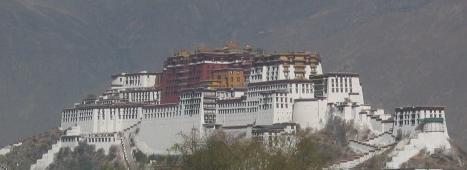There is no truer phrase these days than “it’s a small world.” Cultures globally are bumping into one another, trying to either resist change or to influence one another either of which often has led to all out conflict. In the wake of all of these encounters, our institutions are changing. Like it or not, informal “globalization” has necessarily occurred because of exposure to a variety of lifestyles and belief systems.
China began its take over and assimilation of Tibet in 1951. By 1959, the Dalai Lama had gone into exile in India. Regardless, he followed the old ways, searched for and found what he thought was the reincarnation of the leadership. But Chinese officials did not recognize his successor and the state searched for an appointed its own idea of a reincarnated leader.
Two years ago, Der Spiegel, the German news magazine, asked him whether it was possible to resign as Dalai Lama, given that Tibetans believe him to be the latest reincarnation in a long line of religious leaders. He told them he would “no longer play a political role or a pronounced spiritual role”.Some would like to see the Karmapa Lama, 26, succeed him as the figurehead of Tibetan exiles. Others believe it is time for a more fundamental change. Earlier this year, the prime minister of the government-in-exile told the Guardian: “The age of the old monks is passing and we are looking forward to a young, energetic, lay leadership.” [Guardian]
The Dalai Lama has blurred the issues of succession and reincarnation. Asked if he would be the last, he told Der Spiegel: “The key factor should be the will of the Tibetan people.
The road from monastic orders to the will of the people was not a long one once the Dalai Lama went into exile. Religion and politics have always been intertwined no matter how societies try to order them. But politics seems to have brought this religious leader to his endgame.
The Pope is also hinting that these are not times in which a terribly ill spiritual leader with such tremendous responsibilities internationally could reasonably remain Pope. This came in a week in which he relaxed some rules for the use of condoms.
What is going on here? Next we will see Queen Elizabeth, head of the Anglican Communion, retire and give her authority to her lack luster adulterous son, Charles. Charles as head of the Church of England? What would that do to the institution. Revision to the law of succession in England is underway to allow the succession to disregard the sex of the next in line.
In all three instances, the political landscape has had a great deal of influence on revised thinking as well as a tip of the hat being made to public opinion. The least concerned about the institution he heads appears to be the Dalai Lama. He seems more motivated by personal concerns. But even in his situation, there is a desire to remain relevant in times that are changing. And the agent for all of this change that has accelerated in recent years? Closer contact with and exchange of ideas with divergent cultures.
Regardless of the outcome, change is a constant. Only the size of the change varies. This time around, it looks as if major institutions in the East as well as in the West are making seismic shifts to accommodate current conditions and future prospects.
©On My Watch…the writings of SamHenry. Registration pending.

bydesign001
November 23, 2010
These are rough and exasperating times that truly wears on the elderly and the ill. The world is less understanding while many live their lives in denial of the evil that surrounds them and without honor.
samhenry
November 23, 2010
I think the denial of evil is the greatest threat to us or to an individual. It really exists. Americans have always been so trusting and kind to others. But then we have always had enough and could afford it more than most. I worry that so many are not adequately prepared for the challenges of these times – more than just the elderly and the infirm. I hope I am not overreacting but I fear we are in a time of great shift in societies and how they both are organized and relate globally to each other. I am praying that people are up to the challenge of remaining positive and working through these difficulties without cannibalizing each other. Again, good to see you, by design.
DarcsFalcon
November 23, 2010
Only the size of the change varies. I like that, Sam. That’s a great way to put it. 🙂 You are absolutely right, in terms of human events, nothing stays the same.
samhenry
November 23, 2010
Thank you, DF. Had a bad day today so it’s good to have a compliment out there waiting for me in cyberspace.
DarcsFalcon
November 23, 2010
Aw hon, I’m sorry you’re having a bad day. I wish there was something I could do to make it better. *hugs*
samhenry
November 23, 2010
you already did it with your kind compliment.